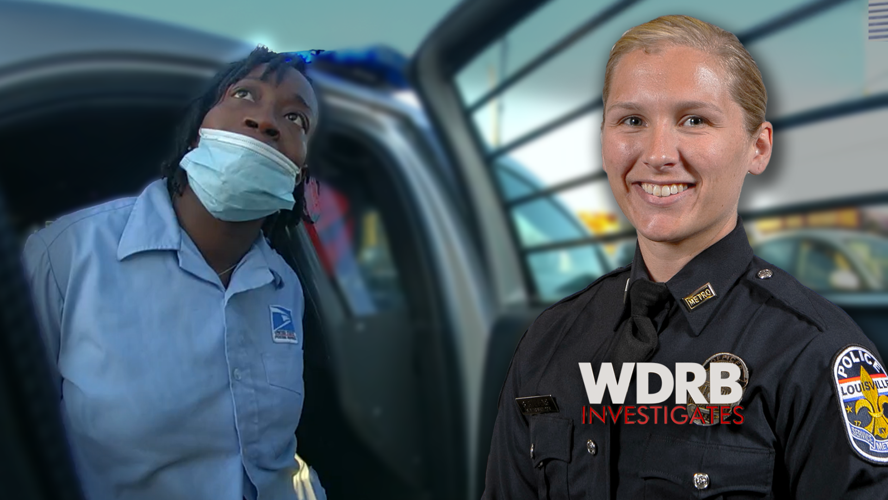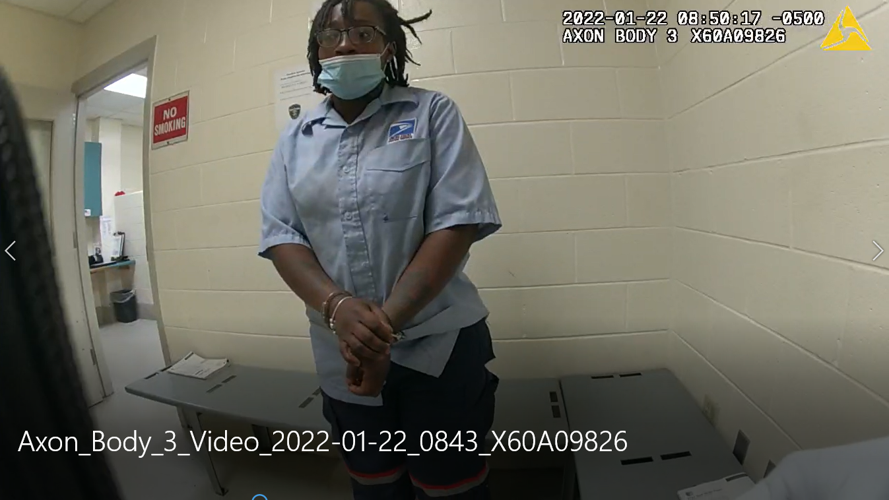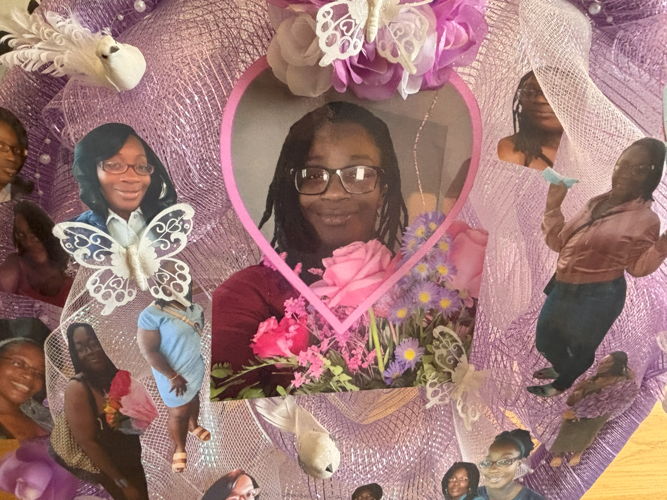LOUISVILLE, Ky. (WDRB) -- Cuqita Boyd got into a minor car wreck while driving to work in January 2022, then was charged with driving under the influence after an officer claimed she didn't follow directions during a field sobriety test.
But Boyd was adamant she hadn't been drinking and asked to be given a Breathalyzer test on the side of the road to prove it so she wouldn't be late for her job as a U.S. postal worker.
The Louisville Metro Police officer, Samantha Davenport, denied that request, later saying she didn't carry a portable Breathalyzer in her cruiser. That "wasn't my thing," she said.
Taken directly to jail, Boyd took a Breathalyzer test about an hour later that seemed to prove she was telling the truth. The test results registered a 0.0 — showing no evidence of any alcohol in her system.
Boyd, still handcuffed and under arrest, then asked for an independent blood test and was taken to a hospital, continuing along the way to ask why she was being charged.
With Davenport looking on, a nurse told both her and Boyd the blood test was clean — with the medical record saying she was "clinically sober" with an "undetectable blood alcohol level."

Handcuffed and under arrest, Cuqita Boyd asked for an independent blood test and was taken to a hospital, continuing along the way to ask why she was being charged.
Regardless, despite this critical lack of evidence, Boyd was briefly jailed and had to fight the case in court for 14 months before it was dismissed. She since has died.
"The officer continued the prosecution for DUI with the knowledge that she was sober," said attorney Greg Simms, who is representing Boyd in a 2024 wrongful arrest lawsuit against Davenport. "That's egregious misconduct."
While it's somewhat rare for people to get arrested for having a blood alcohol level under the legal limit of .08, it does occur, several attorneys told WDRB News.
And it has occurred in a high-profile way in Louisville recently. Former University of Louisville basketball star Russ Smith was arrested June 8 with a blood alcohol determined to be .06. A blood test later determined his level was .065. His case is still pending.
Meanwhile, an LMPD officer was arrested for DUI in Hardin County in June despite a blood-alcohol level below the legal limit.
Under state law, a driver can be charged with driving under the influence if the blood alcohol level is .04 or higher and depending on other factors in the case.
Boyd's situation, however, is even more rare because she was prosecuted for DUI despite a Breathalyzer test and blood test determining she had no alcohol in her system. The arresting officer also acknowledged she didn't smell alcohol and Boyd wasn't slurring her speech.
Simms could only recall it happening one other time in his career: A woman who was in a traffic accident leaving church. The woman, in her 70s, failed a field sobriety test and was arrested by an LMPD officer, but the case was dismissed after she also was found not to have alcohol in her system, Simms said.
In Boyd's arrest citation, Davenport claimed she had "slow motor skills" while trying to provide her proof of insurance and driver's license to police, having to be asked several times for the information.
In addition, according to police, Boyd wouldn't make eye contact with the officer and was argumentative when asked to get out of her vehicle. Police also said she didn't follow instructions during the field sobriety test, according to the arrest report.
Simms argues the real reason Boyd was arrested was because Davenport was upset with her because Boyd stuck up for herself and "the officer didn't like it."
Body camera footage
Police body camera footage from the arrest shows Boyd looking for insurance information on her phone after the wreck, struggling to find it for a few minutes while Davenport stood at the window.
When Davenport appeared to grow impatient and asked Boyd for her driver's license, Boyd picked up her wallet, and the officer grabbed it and walked off.
"Don't snatch, ma'am," Boyd told the officer. When Boyd asked for her wallet back, Davenport said "no" as she walked away.
After returning from checking the license, Davenport opened Boyd's car door and asked her to get out.
Boyd asked why, and the officer said "I'm going to check you real quick" to make sure she was "good to drive."
"I feel like this is harassment," Boyd said. "I'm on my way to work. You are making me late to work. ... I'm on nothing."
Boyd questioned the constitutionality of the officer's actions, including Davenport trying to take off her glasses.
"Don't touch me again," Boyd said.
Both sides were argumentative as the officer gave Boyd a field sobriety test, disagreeing on whether Boyd was following instructions.
"I think you are doing this on purpose," Boyd said. "Can I please go to work? ... This is very embarrassing."
Davenport handcuffed and arrested Boyd when she determined she wasn't following commands.
"What am I being locked up for?" Boyd asked.
"Driving under the influence," Davenport responded.
"Are you serious?!" Boyd said. "I am not under the influence of nothing."
Boyd then asked officers to give her a Breathalyzer test. Another officer at the scene said they didn't have a portable test and "they're not admissible in court anyway," according to body camera footage. It's typical for people arrested on a drunk driving charge in Louisville to take a Breathalyzer test at the scene.
After arriving at the jail, Boyd again requested a Breathalyzer test and asked if she could go when it showed she hadn't been drinking.
Davenport said she wouldn't be released and wouldn't elaborate when Boyd continued questioning the arrest. The officer also wouldn't allow her to call her employer, according to police body cam footage obtained by WDRB.
"Can you please let me use my phone so I can let them know what's going on?" Boyd repeatedly asked.
"That's not our policy," Davenport responded.
"You really owe me an apology after this, ma'am," Boyd told her.
At the hospital, after no alcohol was found in her system, Boyd said she was having chest pains and anxiety and asked that her handcuffs be placed in front of her so she could breathe easier. Her request was denied.
Boyd continued to question Davenport about the arrest and the officer's attitude.
"You can do your job but you can apologize for being wrong doing your job," she said at the hospital. "Blowing 0.0000, nothing in my system."
Waiting for apology
The Jefferson County Attorney's Office, which handled the DUI criminal case, is also defending the lawsuit against Davenport on behalf of the city.
The office argued in a February 2025 court filing Boyd was slow in handing over her license, failed to follow commands during the field sobriety test and was argumentative with police.
"(Davenport) clearly had probable cause to arrest Boyd and there is no evidence in the record that she acted with malice," according to the county attorney's office. The office also noted Davenport wasn't tested for any other substance besides alcohol.
In a deposition taken earlier this year, Davenport testified Boyd was "sluggish" and not communicative, failing to follow orders.

Cuqita Boyd, a 44-year-old mother of five, died in May of this year from complications from high blood pressure.
Asked why she didn't give Boyd a Breathalyzer test, Davenport testified it's not required and she "didn't have one." While there were other officers at the scene, Davenport maintained that she doesn't use Breathalyzers.
"It wasn't my thing," she testified. Davenport also said that she wouldn't have done anything differently at the scene.
Davenport resigned in May 2024 after six years with the department. A police spokesperson said there is no record of any internal investigation into the Boyd case. The department declined to comment on the pending litigation.
Davenport couldn't be reached for comment.
Simms has asked a Jefferson Circuit Court judge for summary judgement, meaning the evidence is so overwhelming that no reasonable juror could find in favor of the defendants, and the case should only go to trial to decide a monetary amount the city should pay.
"Ms. Boyd was prosecuted for more than a year for a DUI where they had conclusive evidence of her sobriety," Simms said. "That should not happen."
Boyd, a 44-year-old mother of five, died in May of this year from complications from high blood pressure. Her family believes the stress of her arrest and the lawsuit contributed to her death and would like an apology from police.
Shakiem Boyd, one of her sons, said his mother would talk about the case daily and was embarrassed by her mugshot and charges.
"It was on her mind heavy," he said. "The main thing she wanted was justice. ... She didn't want to see this happen to other families and other people."
Copyright 2025 WDRB Media. All Rights Reserved.



















